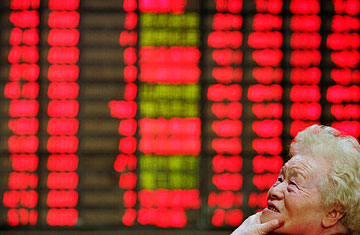
A woman reads information on a electronic screen at a brokerage house in Shanghai September 19, 2008
Asian stock markets posted sharp gains Sept. 19 as investors grew more confident that stepped-up government efforts to contain the damage caused by the U.S. credit crunch would be effective. Japan's benchmark Nikkei index was up 3.8%, Hong Kong's Hang Seng 9.6% and the Shanghai stock index shot up 9.5%, recovering some of the steep losses suffered earlier in the week.
Sentiment was boosted by a 3.9% jump in the Dow Jones Industrial Average and by reports that the U.S. Treasury Department and Federal Reserve are discussing a massive plan to purchase soured mortgages from American financial institutions. Treasury Secretary Henry Paulson said after a late-night meeting in Washington that the plan, the details of which are still being worked out, is "aimed right at the heart of this problem." Markets also got a boost from the Sept. 18 announcement that the world's major central banks would inject $180 billion into global financial markets.
At the same time, Asian governments are beginning to independently take direct action to stabilize their reeling stock markets. China on Sept. 18 said it would waive government taxes on some share transactions to stimulate trading. Chinese government agencies are also trying to put a floor under the market by purchasing shares in publicly listed Chinese companies. Meanwhile, Taiwan's government indicated that a state-controlled fund would be willing to shore up Taiwan company stocks via share purchases.
The moves will boost confidence in the short term, but investors remain jittery, says Tai Hui, regional head of economic research for Standard Chartered Bank in Singapore. "It's not that the financial turmoil is getting any better," he says.
The big Sept. 19 gains were driven to some extent by bargain hunting. After tumbling about 45% from highs reached late last year, Asian stocks now trade at roughly 10 times 2008 earnings — which means they're relatively cheap. Although Asia's economic growth is expected to slow over the next 12 months, the region's financial systems and economies are still fundamentally sound, analysts say. Banks in Asia haven't experienced the dangerous losses on property and mortgages that are devastating their U.S. counterparts. To some, like Hugh Young, managing director at Aberdeen Asset Management Asia in Singapore, the sell-off is providing a buying opportunity. Young's been trolling the markets for solid blue chips and conservative banks with strong balance sheets. "Now's the time to be buying — slowly," he says. "If people are selling because they need the cash, that's what we like."
However, analysts warn that the markets aren't immune from further bad news and the uncertainty level is still high. Goldman Sachs in a note to investors this week said that Asian stocks are "getting interestingly cheap" but analysts "certainly do not pretend to have any real clarity on the near-term market outlook." The investment bank said "for now, most investors in Asia will continue to focus more on cutting risk and hedging positions rather than putting on substantial new risk." The wild ride in Asian markets isn't over.
